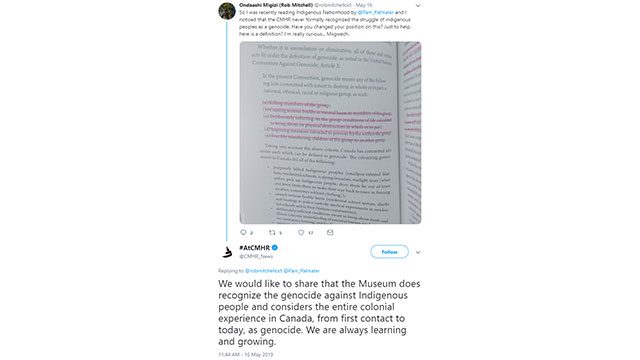The Canadian Museum for Human Rights (CMHR) is publicly acknowledging the past and present treatment of Indigenous peoples in Canada as acts of genocide, following years of criticism on the issue.
“The Canadian Museum for Human Rights (CMHR) has recognized genocide as an appropriate term in discussing and studying public policy towards Indigenous peoples in Canada as part of a colonial experience,” said John Young, president of the CMHR.
The CMHR opened in 2014 amidst a wave of backlash from Indigenous peoples after the museum would not explicitly use the term genocide to describe the way Indigenous peoples have been treated by Canada’s colonial state.
Instead the museum included an exhibit on Indian Residential Schools alongside other genocides of the world.
At the time officials said it wasn’t appropriate for a museum to making those decisions.
“We don’t have the prerogative, legally, to make that judgment if it’s homicide or genocide,” said Jodi Giesbrecht, director of research and head curator at the museum, during the opening in September 2014.
“What we can do is present evidence and encourage that debate.”
A debate that Young says the museum no longer wants to participate in.
“A better way to recognize the harm done [and] the challenges we face as a country going forward is to just recognize genocide,” Young told APTN.
The change came after the Truth and Reconciliation Commission called residential schools a form of cultural genocide in 2015, according to Young.
The change only became public after a visitor of the museum questioned them on Twitter last month about their stance.
The question of what is and isn’t genocide has been playing out across all forms of media this week after the National Inquiry into Missing and Murdered Indigenous Women and Girls released its findings where commissioners called violence against women genocidal.
During the release on Monday Commissioner Michele Audette quickly refuted deniers.
“To the people who don’t think that there is a genocide today, we have 1,200 pages to prove it,” she said.
Young says the term genocide comes with certain implications and may be a reason why many are quick to dismiss it.
“People see that there’s a numerical threshold…whether it’s numbers or certain approaches are necessary for the term to apply,” said Young.
He believes people who question the Inquiry’s findings may lack understanding.
Young adds Canadians should commit to educating themselves and part of this includes reading the Inquiry’s final report.











